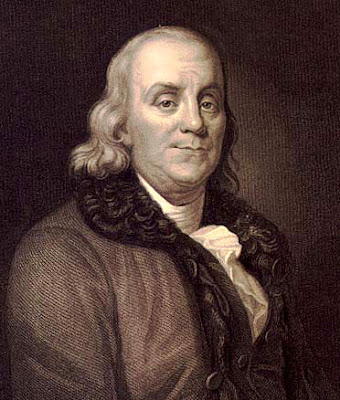A634.6.3.RB - What Are Virtues?
LaFollette (2007) suggested that the best way to live a moral life is by cultivating virtues. Aristotle thought of virtues as character traits and tendencies to act in a particular way (2018). He thought that living a virtuous life was the key to happiness and a good life. Additionally, Aristotle suggested that a virtuous person does the appropriate action, does it habitually, enjoys being virtuous, knows that it is virtuous, and knows why it is virtuous (LaFollette, 2007).
Benjamin Franklin had a lifelong commitment to cultivating virtues. He developed a list of thirteen virtues that he considered were essential to virtuous living. He also developed a chart he carried around with him that he could use to note when he had not adhered to one of the virtues. Franklin focused on one virtue each week, so after thirteen weeks he had spent time trying to cultivate each one. He would then start the process over again. When Franklin began this program he made numerous marks on his chart, but over time he noted fewer and fewer marks, indicating the fruits of his efforts (McKay & McKay, 2008). Franklin’s virtues included:
- Temperance
- Silence
- Order
- Resolution
- Frugality
- Industry
- Sincerity
- Justice
- Moderation
- Cleanliness
- Tranquility
- Chastity
- Humility
As I have pondered on this list, and imagined how my own score card would look after thirteen weeks of grading my own behavior, I see three virtues that stand out more than any other that could use some work: temperance, frugality, and industry.
Regarding temperance, Franklin (McKay & McKay, 2008) suggested “Eat not to dullness; drink not to elevation.” For the most part I eat a healthy and balanced diet. For the most part I avoid eating unhealthy foods, and I exercise portion control regularly. I do not drink alcohol at all. However, I do have a weakness when it comes to what I eat: I love chocolate and candy (M&M’s are my favorite!)! I can say that when it comes to sweets I often “eat to dullness.” I eat it to the point that I am no longer enjoying it, I eat it just because it is there and I have a hard time resisting it.
“Make no expense but to do good to others or yourself; i.e., waste nothing” said Franklin (McKay & McKay, 2008). I am generally pretty good at managing my finances. I have no debt other than the mortgage on my home. Throughout my twenties I was very frugal and worked hard to pay off all my student loans. We owe nothing on our cars. However, as I am now almost through my thirties I find myself not being nearly as frugal as I was when I was working so hard to pay off my debt. I am not a big spender, but at times I do spend money unnecessarily on things that bring no value to myself or others.
I wonder what Benjamin Franklin would think if he was able to see how much time we waste on social media, on binge watching our favorite shows, and in the pursuit of nothingness. He said “Lose no time; be always employed in something useful; cut off all unnecessary actions” (McKay & McKay, 2008). Industry was important to Franklin. Generally I am very industrious. I do not spend much time on social media, I don’t watch much TV, and I generally have a “to-do” list that I am constantly trying to get to the bottom of. However, there are definitely times that I am not very productive. Sometimes I find myself watching too many “how-to” videos on YouTube, or wasting time in menial pursuits.
To overcome my tendency to overeat candy and chocolate, to be more frugal, and to waste less time I am going to follow Benjamin Franklin’s example. I have downloaded an app in my phone called Ben’s Virtues. The app includes a daily chart just like the one Franklin developed. At the end of each day I will score myself on my performance in each area. Over time I hope to see the marks diminish, just as Franklin did. By so doing I will be able to say as Franklin (as cited in McKay & McKay, 2008) did:
Tho’ I never arrived at the perfection I had been so ambitious of obtaining, but fell far short of it, yet I was, by the endeavour, a better and a happier man than I otherwise should have been if I had not attempted it (para. 6).
References
Hendrix, S. (2018, May 21). How to Be Happy: Aristotle’s 11 Guidelines for a Good Life. Retrieved from https://bigthink.com/scotty-hendricks/aristotles-11-guidelines-for-living-a-good-life
LaFollette, H. (2007). The Practice Of Ethics. Malden, MA: Blackwell Publishing.
McKay, B., and McKay, K. (2008, February 24). Lessons in Manliness: Benjamin Franklin’s Pursuit of the Virtuous Life. Retrieved from https://www.artofmanliness.com/articles/lessons-in-manliness-benjamin-franklins-pursuit-of-the-virtuous-life/



Comments
Post a Comment